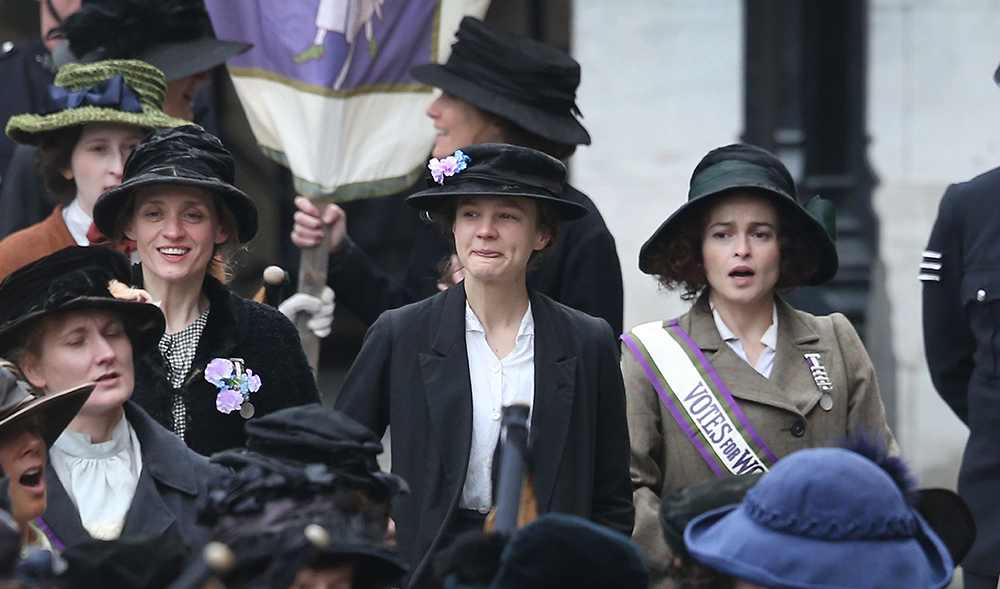 As the big election year approaches, it is easy to forget that women in the United States have only had the right to vote for less than a century. Surprisingly, “Suffragette,” a new drama that tells the story of the involvement of working-class women in Britain’s fight for women’s right to vote, is the first feature film to tell the story of the movement.
As the big election year approaches, it is easy to forget that women in the United States have only had the right to vote for less than a century. Surprisingly, “Suffragette,” a new drama that tells the story of the involvement of working-class women in Britain’s fight for women’s right to vote, is the first feature film to tell the story of the movement.
The film brings us to a small area of London in 1912, where laundress Maud Watts (Carey Mulligan) struggles to make ends meet and is devoted to keeping her husband Sonny (Ben Whishaw) and her son well looked after. We watch her endure terrible working conditions and an abusive boss until she gets to know her co-worker Violet (Anne-Marie Duff) and pharmacist Edith Ellyn (Helena Bonham Carter), who eventually persuade her to join them and follow the admired Emmeline Pankhurst (Meryl Streep) and her radical suffragette movement. The plot proceeds to delve into and expose the violent determination with which these working-class women pursued their right to vote and their continued fight against the government, including Prime Minister H. H. Asquith (who is, rather ironically, the great grandfather of Bonham Carter) and the police, embodied in the film by Inspector Steed (Brendan Gleeson).
With an emotionally intelligent and honest script, British screenwriter Abi Morgan, known for “The Iron Lady,” delivers a story that varies between shocking, heartbreaking and inspiring, all the while leaving you with the sense that you are seeing a very accurate realization of the actual events. Along with director Sarah Gavron, with whom she worked before on “Brick Lane” as well as the same producers, Allison Owen and Faye Ward, she scoured archives of diaries, video footage and newspapers to get as full a picture of the working-class woman’s experience as possible. Helen Pankhurst, great-granddaughter of the famous Emmeline, also acted as an advisor.
“I fell in love with this film from the script,” Pankhurst said. “I read it and thought, Wow, we’re focusing on the issues.’ It’s not about little personalities, it’s not about schisms in the movement, it’s really to get people to understand the transition — how somebody changes to that violence — and that was spot-on.”
This is not a film that indulges in the saccharine sentimentality that so often permeates period dramas, especially those with a
female protagonist. This is likely in large part due to the fact that this narrative is focused almost exclusively on working-class women. The cinematography reflects this desire to show an honest impression of the world these women occupied.
“We wanted to break from what so many period dramas do, which is to create a very beautiful aesthetic, which can be quite distancing as much as you may admire it. So we decided to put you in the shoes of the women then and show how the world looked and create an aesthetic that was true to the time … that wasn’t prettified,” Gavron said.
“Suffragette” also distances itself from the classic “prettified” period dramas by refusing to shy away from providing an honest account of the shocking violence that distinguished the movement.
“You could have done a nice pretty film without it, but to be honest to the reality of both the violence done to them and how far they were willing to go is more powerful and more interesting in terms of how we reflect on the world today,” Pankhurst said.
Another striking choice in this film is the notably minimal appearance of the suffragette movement’s pioneer, Emmeline Pankhurst, especially since she is played by Meryl Streep.
“When we made the decision to not make this a traditional biopic, one of the reasons for that was to give voice to the voiceless — the working-class women,” Morgan said. “But it became also apparent that we needed to show what the goddess looked like. What’s wonderful about Meryl is that you very quickly get that this is a woman who would have many followers and this is a woman who would be inspirational to these young working-class women.”
While it is the women who take center stage in this drama, Morgan has ensured that the audience is able to see the complicated relationships different men had with the movement. Whishaw’s portrayal of Maud’s husband Sonny is particularly heartbreaking, painfully drawing out the mixed response of a husband who struggles with his traditional values and love for his wife.
“Sonny was a very important character because … I don’t think you want to create a complete monster,” Morgan said. “We all wanted a complex man who was really born out of his time, where what he was witnessing was another betrayal, which is his own wife leaving him and his own betrayal, which is his inability to be as strong as her and not being able to run with her in this movement.”
As often occurs with historical films, the events depicted on-screen reflect some strikingly similar themes to issues at the top of current debates. It is impossible to not see the significance of this film about the struggle for gender equality being written, produced and directed entirely by women at a time when the film industry has suffered increasing criticism for its treatment of its female employees. Just weeks before the release of “Suffragette,” actress Jennifer Lawrence published an open letter in Lena Dunham’s newsletter titled, “Why Do I Make Less Than My Male Co-Stars?” In it, she explains her response to the Sony hack that revealed her substantially lower paycheck.
“I didn’t want to seem ‘difficult’ or ‘spoiled.’ At the time, that seemed like a fine idea, until I saw the payroll on the Internet and realized every man I was working with definitely didn’t worry about being ‘difficult’ or ‘spoiled,’” Lawrence wrote.
Lawrence and Maud face wildly different challenges, but that perhaps makes it only more worrying that both individuals reveal an anxiety about seeming “difficult” and daring to step out of line in their unique situations. For Gavron, this feeling is one that needs to be overcome to broaden the narratives that appear on our screens.
“I am passionate about promoting diversity behind the camera,” Gavron said. “That is key because over 90 percent of films each year are directed by men, but also mainly white, straight, well-educated men. We have to change that. We have to get people of all parts of society telling stories because that reflects the culture we live in.”
Gavron’s comments on the need for diversity come partly in response to criticism about the film’s treatment of racial diversity. A photoshoot for Time Out London magazine to promote the film showed cast members wearing T-shirts with the slogan, “I’d rather be a rebel than a slave,” a phrase that Emmeline Pankhurst delivered at a rally depicted in the film. The images went viral and sparked online outrage. Helen Pankhurst explained her concern about the now-infamous phrase being misconstrued.
“If Emmeline knew how her words would be interpreted in the way they are now she would be shocked. One of the first social-consciousness-raising elements that she remembers as a young child was that her father was an abolitionist and that she was involved in that campaign, so she would be horrified to know that her words were being taken out of their context,” Pankhurst said.
Morgan agreed, emphasizing the importance of understanding the historical context of England at the time.
“Most of the waves of immigration didn’t come until after the first and second World War. So we didn’t at that time have the diverse Britain that we have today. We’re acutely aware of the tensions around the subject and recognize the discourse that we have to keep having … but equally, it would be unfortunate if it became the narrative because I think you can sincerely see the intention of the film, which is about promoting global equality for all women across the world,” Morgan said.
The film is not one to provide answers to questions still prominent in the contemporary women’s movement, but it does serve as a reminder of the huge strides that have been taken so far. And, as Morgan stressed, the timing of this film’s release is critical in reminding us of the value of the vote and political struggle.
“As the biggest dwindling voting population is young people, and more than that young women, I hope it inspires them to understand how hard-won that vote was and that we mustn’t be ambivalent and we must believe that if we elect the right person then policy can change, and if policy can change so can law,” Morgan said. “That’s exciting, I think.”



















